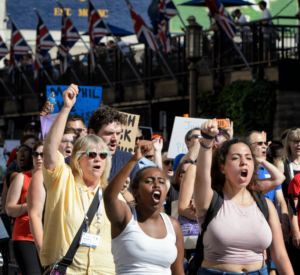Arrests provide teachable moment on teacher union politics
On Tuesday, hundreds of teachers attending the American Federation of Teachers convention in Minneapolis joined a Black Lives Matter march through the city’s downtown. They said they were protesting the recent police-involved killing of Philando Castile, a St. Paul Public Schools’ employee.
Twenty-one teachers—including Minnesota union leaders—were arrested after blocking streets for three hours.
Two quotes from news reports caught my eye.
The first was from Denise Rodriguez, president of the St. Paul Federation of Teachers. According to MPR, Rodriguez said the federation is committed to the Black Lives Matter movement, and Castile’s death is a tipping pint.
‘We can’t just go out and march and grieve and talk and then go back to our lives. We’ve got to keep the pressure on,’ Rodriguez told protesters. ‘And if there’s not serious justice for Philando we will be out here again and again and again so we don’t add more names under that list.’
Rodriguez failed to mention, of course, that the officer who shot Castile says he was reacting—not to the man’s race—but to the gun he saw in Castile’s car.
In fact, St. Paul teachers know full well that it’s not racism that causes the violence that brings young black men disproportionately into contact with the police. Just months ago, Rodriguez was protesting the alarming dangers that St. Paul teachers themselves face from students—primarily black—in their own classrooms and school hallways.
In December 2015, St. Paul teachers threatened to strike after a particularly brutal student-on-staff assault, in which a black student body-slammed and choked a Central High teacher, who sustained a traumatic brain injury.
After the attack, Rodriguez took a different line: ‘Ask yourself this,” she told the Pioneer Press. “Do students and staff deserve to come to work every day and not expect to be assaulted? Teachers want to know who has our back with this violence.”
It’s not racism—by police or teachers—that causes the violence to which so many young black men are prone. The fundamental cause, as teachers surely know, is family breakdown, the absence of fathers in the home, and the chaotic environments in which so many young men are raised as a result. In St. Paul, the out-of-wedlock birth rate for U.S.-born blacks is a jaw-dropping 87 percent, as opposed to 30 percent for whites. (The City of St. Paul does not release such data; they were obtained through a FOIA request by Intellectual Take-out.)
Things aren’t likely to change for the better until that sobering statistic changes.
The second comment that caught my eye was by Kandace Montgomery, a Black Lives Matter organizer at the protest. She told MPR:
‘If we really want to push forward education, if we want to do all these things around closing the achievement gap, we need to actually address the systemic issues that are getting in the way of young students of color—in particular black students—from being able to learn, which at this point is being able to just live.’
Montgomery is right that young black men face a threat “just to live.” But the danger they face is from other young black men, not police. Homicide is the leading cause of death of black men under age 45, and nearly all of those killed are murdered by other black men.
When will teachers march to protest—or even acknowledge—this terrible reality? I won’t hold my breath.